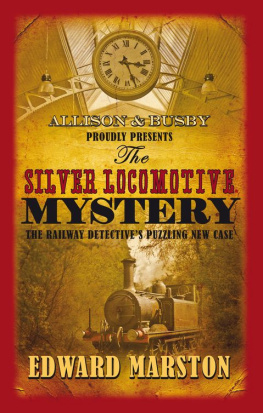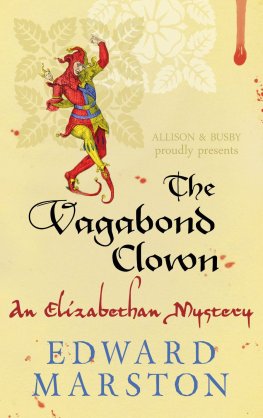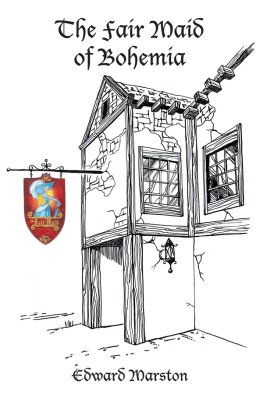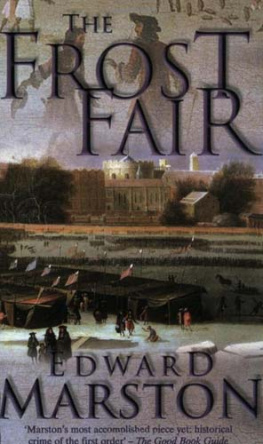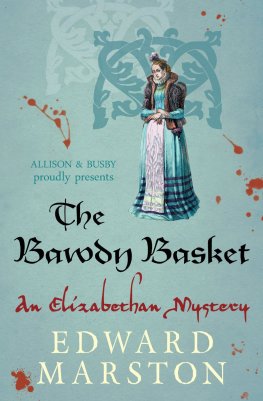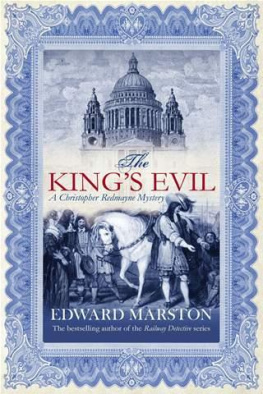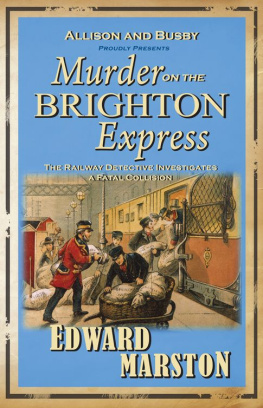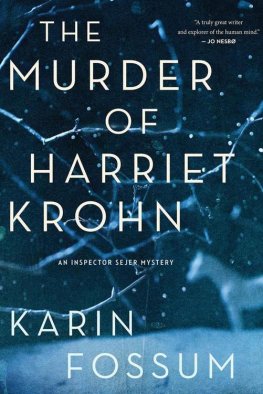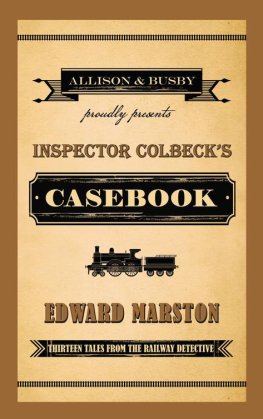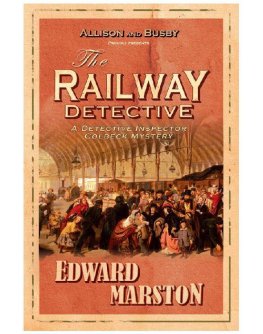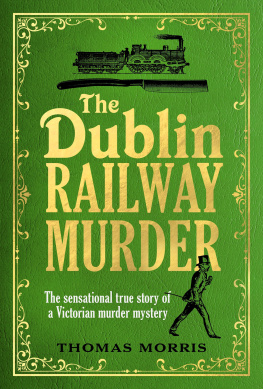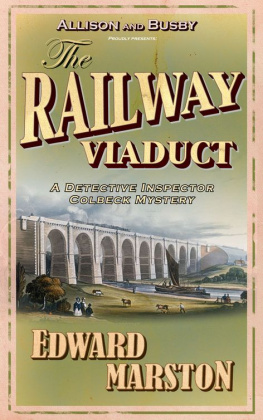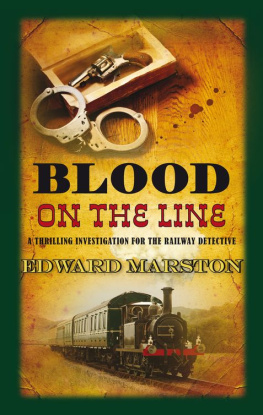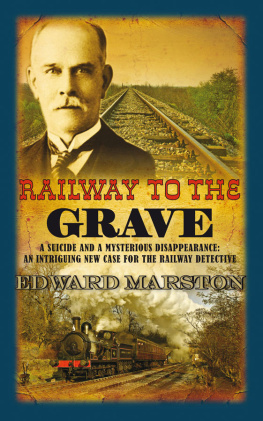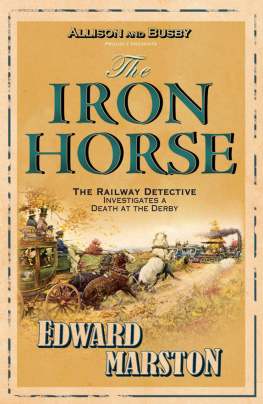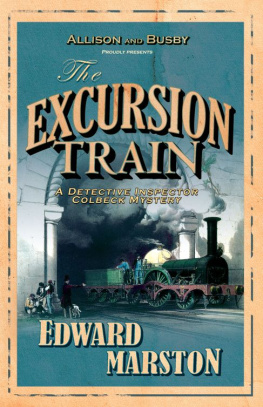There is a criminal mastermind, a doughty policeman in hot pursuit, plot twists aplenty and enough historical detail to evoke the period without bogging us down. Great fun
A grand romp very much in the tradition of Holmes and Watson and Cribb and Thackeraypacked with characters Dickens would have been proud of. Wonderful, well written
Excellent Marston is probably the best of our British writers of historical crime stories
This is writing that can be described as the literary equivalent of the roller coaster. There is never a dull moment as Detective Inspector Robert Colbeck untangles a web of murder, blackmail and destruction. What more can the reader require?
Told with great colour and panache This is how history mysteries should be: fine storytelling, marvellous characters reminiscent of the great authors of the mid-Victorian period, and a sneaky mystery, too
Edward Marston is famous as a writer of whodunits This author is at his best writing about amiable heroes and hissable villains having some good-humoured adventures in an entertaining plot
1855
Nigel Buckmaster knew how to make an entrance. When he swept into the bustling concourse at Paddington Station, the crowd parted before him as for royalty. Those close to the actor-manager gaped and gasped as he strode past. Those farther away craned their necks to see what all the fuss was about. Tall, lean and lithe, Buckmaster wore a black cloak that swished behind him and a wide-brimmed black felt hat out of which long, lustrous, dark locks fell to his shoulders. His face was striking rather than handsome, his most significant features being a pointed chin and two large, smouldering eyes separated by a narrow, tapering nose. It was the face both of a hero and a villain, combining bravado with menace in identical proportions and exuding a sense of unassailable purpose.
Contributing in equal part to their dramatic arrival was the stately leading lady whom Buckmaster led on his arm. Kate Linnane was approaching thirty but she still had the stunning bloom and beauty of a much younger woman, features glowing, eyes dancing, delicate chin uplifted with regal disdain. Blond curls peeped out from a poke bonnet trimmed with ostrich feathers. Her light blue waistcoat was in subtle contrast to the exquisitely tailored navy jacket. Hidden beneath a decorated navy skirt that ballooned outwards, her feet tripped along so gracefully that she appeared to be gliding in unison with the majestic gait of her companion. Opened the previous year, the London terminus of the Great Western Railway was a spectacular cathedral of wrought iron and glass where thousands of passengers came to worship daily at the altar of steam. Nigel Buckmaster and Kate Linnane had momentarily transformed it into a vast apron stage on which they could perform before an open-mouthed audience.
As befitted such a splendid couple, there was a sizeable retinue in their wake. Where they led, other members of the troupe followed. First was a group of strutting, long-haired actors of varying ages along with some pretty, perfumed, gesticulating young actresses, eager to grab their share of attention. Behind these preening peacocks was a motley stage crew, noticeably less well-dressed and marked by an air of collective resignation. The cavalcade was completed by a line of porters wheeling well-worn trunks on their rumbling trolleys or carrying costume baskets, scenery and stage properties on their rattling carts. Buckmasters Players were on the move. They surged on to the platform as if commandeering the whole train. A strict order of precedence was observed. While the two luminaries headed for a first class carriage, the other artistes had to travel second class and the remainder of the company was forced to supervise the loading of the luggage and the theatrical paraphernalia before being received into the comfortless embrace of third class.
Buckmaster opened a carriage door with a flourish so that Kitty could step into the compartment. When he climbed in after her, he shut the door, flung off his hat, whisked off his cloak and sat with his back to the engine. Kate lowered herself on to the seat opposite him. Now that there were no spectators to impress, she let her features rearrange themselves into an expression of sheer boredom.
I hate all this travelling, Nigel, she said, peevishly.
Needs must when the devil drives, he told her. If the mountain will not come to Mahomet, then Mahomet must go to the mountain.
Why can we not play at Drury Lane or Covent Garden?
Because they dont yet deserve us, my love, he said with a grandiloquent gesture. Until they do, we must seek pastures new.
Kate sighed. But why on earth must we do so in Wales? she complained, bitterly. Its like being cast into outer darkness.
Twenty minutes later, just before the train was due to depart, two figures suddenly appeared outside their carriage. Kate was annoyed that their privacy was about to be invaded but Buckmaster took an interest in the touching little scene that was being played out only feet away from him. Though he could hear no words, he found the mime eloquent. A short, whiskery old man with rounded shoulders was giving a set of instructions to the passenger, peering over his glasses and wagging his finger repeatedly. Still in his twenties, his companion had a fresh-faced, boyish look to him, nodding dutifully in obedience and releasing an occasional affectionate smile. He was carrying a large bag, its heavy weight making him shift it from one hand to the other. Judging from his apparel, his bowler hat and the worried glances the young man threw at the train, Buckmaster surmised that he was not a regular traveller in first class. Indeed, when he eventually opened the door, he looked around warily as if unsure if he was entitled to climb aboard.
Come in, come in, my friend, said Buckmaster, beckoning him forward. We are delighted to have some company.
Resenting the newcomer, Kate hid her irritation behind a dazzling smile. He gave them both a nod of gratitude then stepped between them and sat by the window on the opposite side of the compartment. Buckmaster pulled the door shut and nodded to the man on the platform. Within a minute, a whistle sounded and the locomotive exploded into life. As the train moved forward, the young man gave a farewell wave to his erstwhile escort. Mouthing some last advice and with one hand holding his top hat in place, the old man scurried solicitously alongside the carriage until he ran out of breath and platform. Buckmaster was intrigued.
You are a regular Laertes, my friend, he observed.
The newcomer blinked. I beg your pardon, sir.
You are clearly not familiar with the greatest play ever written. I refer, of course, to William Shakespeares Hamlet, a role in which I have garnered endless plaudits. In earlier days, however, when I was a juvenile in the company, I often took the role of Laertes and received wise counsel from my father, Polonius, in much the same way as you took advice from your own revered parent just now.
Mr Voke is not my father, sir.
Buckmaster was surprised. Really? Did my eyes deceive me?
Its true that he has been like a father to me in some ways, said the other, nervously, especially since his own son deserted the business, but we are in no way related. Mr Voke is my employer.

